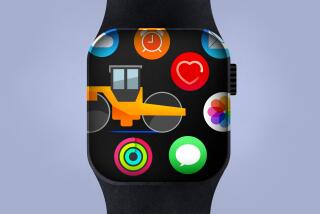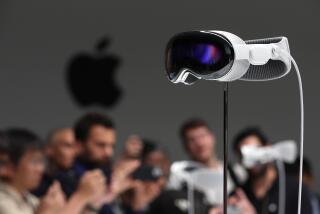When the Elite Meet to Fight Computer Defeat
- Share via
“Extremism in the defense of liberty is no vice.”
--Barry Goldwater, 1964
*
These are trying times for Apple and the Mac. Do trying times call for desperate measures? Apple and many Mac users seem to think so.
Apple Fellow Guy Kawasaki--the original “evangelista,” as many Apple marketers are known--has attained celebrity status with his hilarious anti-Windows diatribes and prowess at rallying the Mac-using troops to defend their chosen computer.
Kawasaki combines quasi-religious zeal and allusions to anti-monopolist rebellion on his Web site (https://www.evangelist.macaddict.com) and in his daily e-mail broadcast--which reaches tens of thousands of Mac fans--of good news and ideas for guerrilla warfare.
He routinely stirs hundreds, even thousands of “evangelistas” to throw e-mail bombs--filling the boxes of those who knock Apple or the Mac with everything from thoughtful critiques to obscene flames--or to ballot-stuff any Web-based opinion poll involving the Mac.
In fairness, they’ll also send hundreds of love notes when a journalist praises the Mac. And his acolytes sometimes perform good deeds, such as wiring up local schools for the Net.
Kawasaki is masterfully tapping a deep reservoir of frustration and loyalty. But long before he took his current job, Mac users showed an amazing predilection toward self-organized action. The World Wide Web is littered with spontaneously generated Mac-defense and booster sites.
Much of the press has a dim view of Apple’s survival prospects, and many institutional buyers are abandoning the Mac. So if Apple can’t out-advertise the competition, why not exploit users’ intense feelings to keep the Mac alive and strong?
To understand my answer, first consider the larger context: The Mac’s contribution has been profound and its survival is crucial to creative diversity in computing. Apple’s history is emblematic of core American values--individualism, creativity and, yes, freedom. All this sometimes causes fans to forget that Apple is still a business.
As Kawasaki wrote some years back, Apple’s “day-to-day motivation is to sell more Macintoshes. Apple does have lofty and noble goals like improving the productivity of its customers, but don’t think of it as a magic kingdom with young Marxists sitting around in beanbag chairs wearing Birkenstocks and discussing the empowerment of the individual. This is a Fortune 500 killing machine that exists to increase the wealth of its shareholders.”
In that light, it’s easy to understand that the expressions of almost-spiritual faithfulness to the Mac, although heartfelt, weren’t a purely spontaneous response to a sublime creation. They were a response to a calculated marketing ploy to sell computers that cost much more than competing brands. I’m not making this up. Members of the Mac’s original engineering and marketing team told me all about it.
They did it by building a sense of belonging to a kind of elite club by portraying the Mac as embodying the values of righteous outsiderism and rebellion against injustice. But the strategy also engendered an arrogance that pollutes the Mac community and alienates people who might otherwise be open to a Mac.
It all started in the early ‘80s with the famous “1984” TV commercial that launched the Mac, and continued with “The computer for the rest of us” slogan and several ad campaigns playing on a revolutionary theme.
Apple’s ads have changed, but as Kawasaki shows, it never fully abandoned the old ways. (“Evangelista,” by the way, is a play on “Sandinista,” the Nicaraguan revolutionary party.) When used to harass, Kawasaki-style tactics tend to repel rather than educate Macintosh “enemies.” True, “evangelista” actions occasionally save a company from dumping its Macs, and they often help keep pockets of users in the fold. This column, even, is in part a result of nonstop prodding by the Mac community.
The problem is, overreliance on fanatic faithfulness led to years of complacency at Apple, the business. And it’s not working now--just look at Mac sales figures.
Only brilliant management and marketing of Apple’s superb products can make the Mac the force it should be. Mac fanaticism often makes devoted users look strident, whiny and bullying. Yikes--that’s the image Microsoft should have. But then, Microsoft understands marketing.
*
Charles Piller can be reached via e-mail at cpiller@aol.com






